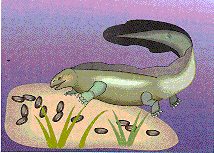
Sharon Hall
Here is the second winner of the Does God Exist?
scholarships we offered in memory of Phyllis' mother Edith Lawson and
John's
aunt Constance Parsons. To qualify, applicants had to write an essay on
how science supports belief in God and how they plan to use this to
help
others.

When Charles Darwin shock the faith of those who believed in God and challenged those who would defend Creationism, many people condemned him as a heretic. The idea that an all powerful being DID NOT speak the earth into existence was unthinkable. There began the rift between science and religion that appeared permanent. Forever, it seemed, scientists could not be religious and the religious could not be scientific. There was an irreconcilable perception of what Darwin said and what the Bible said. Today, however, there are many educated men and women, scientific and religious alike that are saying that it is possible to reconcile the miracle of Creation with the evidence of evolution.
The Problem: "In the beginning God created the heavens and the earth" (Barker 6). "Living organisms have descended with modification, from earlier inhabitants of the earth" (McGowan 4). These two statements present two very different explanations for the existence of life, and especially for the existence of humans. Before Darwin's theory people earthwide generally believed in some divine form of Creation. Science came along and seemingly shattered that belief. The problem today is that many creationists are thinking people and struggle with the fact that their faith apparently does not compensate for the evidences that science has offered for evolution. The problem for scientists today is that some are finding that they cannot answer every question presented by evolution and many are finding that design demands a designer (Gardner 107). To determine if this is actually a problem or merely a perception problem a close look needs to be taken into the Bible and into Darwin and see if what they are saying is all that different. Also, an examination of the commonly perpetuated myths about Creation and evolution is necessary in order to determine if a synthesis of faith and fact is possible.
Creation: To undo some of the
confusion
on the Creation verses evolution debate the first place to go would be
directly to the source: the Bible. One simple question needs to be
answered:
how does the Bible say the earth was brought into existence?

The Bible deals with the beginning of the earth first and foremost by stating that "In the beginning God created the heavens and the earth. Now the earth was formless and empty, darkness was over the surface of the deep and the Spirit of God was hovering over the Water" (Barker 6). Genesis, which apparently was compiled by Moses, goes on to tell the order in which life came into existence. Moses says that God created the earth in six days and that God rested on the seventh day. Whether the "day" can be taken literally or is a figurative expression is the subject of heavy controversy by scholars. That subject will be approached later in this paper, but for now the word "day" should be considered a figurative statement for the sake of the argument. On the first "day" God created lightness and darkness, separated the two and named them night and day (Barker 6). On "day" two, God created an expanse between the waters and the skies (Barker 6). On the third "day" God created land and seas. Then God created seed-bearing plants and trees, vegetation, and fruit (Barker 6-7). With "day" four came the seasons, produced by the creation of the sun, moon, and stars (Barker 7). On the fifth "day" God filled the oceans with living creatures, birds in the air, and great creatures of the sea. God instructed all to be "fruitful and increase in number and fill the water in the seas, and let the birds increase on the earth" (Barker 7). The sixth "day" is probably the most important in the story of Creation as far as explaining the existence of humans. The sixth "day" brought livestock, wild animals, and all the creatures that move along the ground.
Then God said, "Let us make man in our image, in our likeness, and
let
them rule over the fish of the sea and the birds of the air, over
livestock,
over all the earth, and over all the creatures that move along the
ground."
So God created man in his own image, in the image of God he created him
(Barker 7).

God in the same day creates woman from a rib of man in order to keep him company (Barker 7-8). "Thus the heavens and the earth were completed in all their vast array" (Barker 8).
As far as the Bible goes, the explanation for creation is completely explained in the paragraphs above, that is the story and that is how it went. There were no other explanations given nor does the Bible offer up any facts about time, which is a very big hang up in the conflict between science and religion. This conflict, logically, should be cleared up first. Once again the best place to direct one's attention to would be the source. How old does the Bible say the earth is? The truth is that it does not. Archbishop James Ussher has perpetuated the myth that this is a young earth (Thomas 174-175). The Bible, however, says nothing of time, in fact 2 Peter states that "with the Lord one day is a thousand years and a thousand years is as one day" (Thomas 192). James Ussher was of the assumption that certain records of genealogy in Genesis are complete (Thomas 175).
He uses this assumption to formulate the age of the earth, and this is incredibly misleading. In actuality the earth could be four billion years old (Berra 38), if that is how long God needed to set things into motion.
What about dinosaurs? There are several sad myths used to explain the fossils. The simplest myth of course being that the flood wiped out the dinosaurs. The saddest being that God placed these fossils there to trick humans.
What, then, of evolution? What are the facts and what are the myths?
Evolution: How do scientists, Darwinists, and evolutionists explain the beginning of the earth, the beginning of life?
Science has not discovered everything, and there is some debate, but
there is a generally accepted order to things. Geological time scales
(Berra
34, McGowan 101) show that algae and worm-like animals appeared on the
earth first. Next in the evolutionary chain were jaw-less fish, jawed
fish,
amphibians, and reptiles. After that, reptiles, birds, dinosaurs, and
mammals
evolved. From these life forms evolved primates, monkeys, "ape-men,"
and
finally humans. Darwin's theories were based on three assumptions: all
living things vary, all life is inclined to increase and therefore
there
must be destruction at some time, and finally that the number of
species
tends to remain the same year in and year out. From these facts he
derived
that life is a struggle and only the fittest survive (Moore 30). Most
of

 the Darwin's theory of evolution deals primarily with life once it was
formed on earth. What of the earth, where did it come from? There are
several
theories to explain where the earth came from. The one used in this
paper
for the sake of argument is the "Big Bang" theory. After the Big Bang,
stars and the solar system formed out of aggregated matter. For eons
and
eons the earth was so hot that it only existed as molten rock. About
3.5
billion years ago, solid rock formation came about by the cooling of
the
earth (Berra 72). This would be the kind of absolute beginning the
earth
would need to have to support the theory of evolution.
the Darwin's theory of evolution deals primarily with life once it was
formed on earth. What of the earth, where did it come from? There are
several
theories to explain where the earth came from. The one used in this
paper
for the sake of argument is the "Big Bang" theory. After the Big Bang,
stars and the solar system formed out of aggregated matter. For eons
and
eons the earth was so hot that it only existed as molten rock. About
3.5
billion years ago, solid rock formation came about by the cooling of
the
earth (Berra 72). This would be the kind of absolute beginning the
earth
would need to have to support the theory of evolution.
The first most commonly perpetuated myth is not about evolution, but about Darwin. Many people, because Darwin refuted the story of divine creation, believed that Darwin despised Christians and their beliefs. The myth lead to other myths like all evolutionists are evil and all evolutionists hate Christians. This was not the case at all. Neal Gillespie's book on Darwin's theism refutes this belief. While Darwin came to have a disbelief in God and the Bible he still enjoyed Church. He thought Church as more of a mental exercise. He often chose freely to attend church on or off the Beagle as a diversion (Gillespie 137).
The second commonly perpetuated myth is that evolution is all
fact and that it cannot be argued with in anyway. This may seem out of
context considering the argument of this paper is that evolution and
Creation
do not come into conflict with one another. It is fitting though as
will
be seen later in the paper. Most people who claim Creation as fact, not
figurative speech, will argue that Darwin's theory of evolution goes
against
modern scientific findings, this is their fuel to fan the flame of
ignorance.
In reality there are not many people today who would say that Darwin's
theory, in its original form is totally correct. Over time the theory
has
evolved just as science has. The theory has adapted itself to proven
facts.
Darwin's theory was a starting point for findings to come.

The story of Creation, and the theory of evolution are two incredibly different explanations for one very certain fact: There is life on earth and the earth is uniquely suited to sustain life. How can one think to believe in both concurrently.
Synthesis: The first thing to keep in mind when being presented with this seemingly abstract idea is exactly what both "doctrines" deal with. The Bible is a "religious" text, not scientific. Science is a process of reasoning, not a doctrine of feelings. Therefore, what they accomplish in the end are two different things. Is it possible to conceive that they do say the same thing essentially? In a word: yes.
Genesis 1:1 states that matter exists and it exists in a way that could produce and sustain life. Evolution does not deal with Creation. It only deals with how things may have changed once they were already created. The startling similarity between how the Bible describes the early condition of the earth (formless and empty) and how the Big Bang theory describes the earth cannot be ignored. The more clinical description of course would be found in science, but the Bible does not conflict with it. Next, the facts about the beginnings of life. The Bible gives a particular sequence, and the fossil record supports this beautifully. There are many things that the Bible does not explain, but everything it does say is correct. The first thing that happened in the earth's earliest stages was small life forms such as algae and sea creatures. In the story of Creation the first forms of life were forms of vegetation. The next step that the earth took, scientifically, were jaw-less fish and then fish. The next steps in the Creation story were the stars and the sun and the moon, but it is possible to conceive that evolution was occurring while the universe was evolving. After the sun came fish, then birds and greater sea creatures. In the evolutionary chain amphibians, birds, and flowering plants came next. These flowering plants would have to thrive on sunshine. On the final "day" of Creation came mammals and man. In the evolutionary chain, mammals and man were the most recent additions.
So far, if all that has been said about time, evolution and the
Creation
have been true, then the story of Creation and the theory of evolution
do not come into conflict. There is absolutely a synthesis between the
two. In some ways one answers questions where the other does not. The
beauty
of evolution and of Creation is seen in the fact that everything could
easily be the product of a grand design by a grand designer. Evolution
is a tool and the plan and design of this grand designer.

The issue of mankind gets a heading of its own because it is so
important
in this entire argument. The more accepted belief of the religious
world
is that man is special, a species set aside from all others. Mankind is
godbreathed and therefore could not have evolved from a "lower
life-form."
This is an untrue statement up to a certain point. Whether or not a
human
has a soul is an issue separate and removed from this paper and so it
will
not be approached. Pope Pius XII did have an interesting, but possibly
contorted view on the subject though. "A Catholic is free to accept any
scientific theory about human origin provided it is acknowledged that,
at some stage, God infused an immortal soul into a human body. This
requires
an act of faith, but not a denial of science" (Berra 124). There are
several
different theories about when exactly the modern form of homo
sapiens
sapiens evolved to the stage that they are at today. It is
generally
accepted that they made a definite appearance approximately 40,000
years
 ago (Moore 123). Up to that point humans had been in a
lesser state, and
had only crude, nomadic civilizations. In terms of hundreds of
thousands
of years ago, archaeologists do not speak of civilizations such as
those
that exist today. However, there is definite evidence of civilizations
dating back 10,000 years. Genesis 4 talks about the building of cities,
production of musical instruments, and tools (Thomas 176). A 30,000
year
gap between the evolution of modern man and the establishment of
civilzations
is not a long time in the grand scheme of things. If God or science
took
billions of years to form the earth, then it is also conceivable that
these
same forces willed for mankind to come into existence as early as
40,000
years ago.
ago (Moore 123). Up to that point humans had been in a
lesser state, and
had only crude, nomadic civilizations. In terms of hundreds of
thousands
of years ago, archaeologists do not speak of civilizations such as
those
that exist today. However, there is definite evidence of civilizations
dating back 10,000 years. Genesis 4 talks about the building of cities,
production of musical instruments, and tools (Thomas 176). A 30,000
year
gap between the evolution of modern man and the establishment of
civilzations
is not a long time in the grand scheme of things. If God or science
took
billions of years to form the earth, then it is also conceivable that
these
same forces willed for mankind to come into existence as early as
40,000
years ago.
While science continues to evolve as man's knowledge of how things
work
moves forward, the Bible stays the same. Of course, there are different
interpretations of the Bible, but the basic statements are clear. The
fact
of the matter is that a basic look at the Bible and at evolution does
not
dilute the message of the Bible or the continuing progress of science.
The truth in the matter is that if God does exist, then man will always
strive to move closer to understanding His capabilities. The reason
that
 theories stay theories and the
Bible remains unchanged is best summed up
by Job 11:7-9.
"Can you fathom the mysteries of God? Can you probe the
limits of the Almighty? They are higher than the heavens-what can you
do?
They are deeper than the depths of the grave-what can you know? Their
measure
is longer than the earth and wider than the sea" (Barker 737). There
are
some things that even the most intelligent people cannot explain away,
and in this respect the Bible may account for some things. An
anti-creationist
best sums this thought up. "We do not claim to be able to document the
evolution of living organisms from non-living ones, but the evidence we
have presented makes a convincing case that such evolution was possible
(McGowan 53). This may not be the only explanation for our earth and
all
that is in it, but upon close inspection, even the most skeptical
critic
should admit that there is some validity to the argument. This idea is
worth consideration by evolutionist and creationists alike.
theories stay theories and the
Bible remains unchanged is best summed up
by Job 11:7-9.
"Can you fathom the mysteries of God? Can you probe the
limits of the Almighty? They are higher than the heavens-what can you
do?
They are deeper than the depths of the grave-what can you know? Their
measure
is longer than the earth and wider than the sea" (Barker 737). There
are
some things that even the most intelligent people cannot explain away,
and in this respect the Bible may account for some things. An
anti-creationist
best sums this thought up. "We do not claim to be able to document the
evolution of living organisms from non-living ones, but the evidence we
have presented makes a convincing case that such evolution was possible
(McGowan 53). This may not be the only explanation for our earth and
all
that is in it, but upon close inspection, even the most skeptical
critic
should admit that there is some validity to the argument. This idea is
worth consideration by evolutionist and creationists alike.
Barker, Kenneth, ed. The New International Version Study Bible,
Grand Rapids: Zondervan, 1995.
Berra, Tim M. Evolution and the Myth of Creationism: A Basic Guide
to the Facts in the Evolution Debate, Stanford: Stanford UP, 1990.
Gardner, Lynn. Christianity Stands True: A Common Sense Look at
the Evidence, Joplin, Mo: College Press, 1994.
Gillespie, Neal C. Charles Darwin and the Problem of Creation,Chicago
and London; University of Chicago Press, 1979.
McGowan, Chris. In the Beginning...A Scientist Shows Why the
Creationists
are Wrong, New York: Prometheus Books, 1984.
Moore, Ruth, Evolution, Nederland: Time Life, 1977.
Thomas J. D. ed. Evolution and Faith, Abilene, Tx.: ACU Press,
1988.
Note: There are a few differences between Sharon's understandings and ours on this topic. If you are interested in our approach, contact us for our explanations on the topic in our book God's Revelation in His Rocks and His Word.
Back to Contents Does God Exist?, NovDec00.